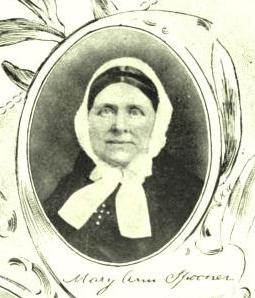MRS. MARY ANN SPOONER.
Mrs. Mary Ann Spooner, the daughter of Prosper Wetmore and Catharine McEwen, and granddaughter of the Rev. Izrahiah Wetmore, pastor for many years of the Presbyterian Church of Stratford, Conn., was born July, 1794, in New York City. She was married March, 1831, to Colonel Alden Spooner, who established in 1811, the first newspaper in Brooklyn, The Long Island Star. The church (St. Ann’s Episcopal) in which she was married stood where now is the entrance to the Brooklyn bridge.
Previous to her marriage, she taught in Brooklyn, and on becoming a widow with one child, a daughter, she opened a little school in the suburbs for a short time only, when she removed to Lockport, N. Y., to reside in the family of Mr. Hiram McCollum, whose children she instructed. She removed successively to Buffalo and Rochester. In the latter city she passed the last eleven years of her life, expiring peacefully at St. Mary’s Hospital, surrounded by her daughter, kind friends and the devoted Sisters, on Dec. 17, 1877, aged 83 years, and was burled in Stratford, Conn., in one of the oldest burial places in the country.
Though Mrs. Spooner was reared in a Presbyterian family, she never joined that communion, but became a member of the Episcopalian, and taught the first Sunday school class in old St. Ann’s. In 1842 she embraced the Catholic faith, remaining firm and fervent therein to the close of her life.
Mrs. Spooner began to write at the age of fifteen and continued at intervals until within a month of her death. In 1848 she collected a volume for publication, entitled Gathered Leaves, receiving high encomiums from Halleck, Irving and Bryant. Her later effusions appeared in the newspapers. An “Essay on Genius” was read at the Brooklyn Lyceum in 1834.
Mrs. Spooner dedicated her poems “The Christophers” and “The Infalllbilites” to His Holiness, Pope Pius IX., having a copy illuminated and presented to the Holy Father through the medium of the Prefect of the Propaganda, who handed it to His Holiness, telling him they were sent by a young lady of 80 summers. The Pope laughingly replied: “I am likewise a youth of 80 winters.” His Holiness was much pleased with the offering and the loving thought that prompted it, and sent his special blessing, with a silver medal and his photograph bearing a few words in his own handwriting, through the Very Rev. Vicar-General of the diocese of Rochester.
Mrs. Spooner was of artistic temperament in other lines than literary. She sketched and painted, but a delicate eye-sight debarred her persevering study in art. She drew a picture of St. Ann’s Church before its demolition, which was copied into a recent history of Brooklyn, without, however, giving credit to the author. Several other sketches of various subjects are in existence.
Her many endearing qualities, noble deeds and generous acts need not be recorded here. She was proud to be an American and her daughter, Mrs. Wilber of Lockport, N. Y., is now proud to place her venerated mother’s name among the Catholic women writers of America.
NIAGARA.
(Written at the Falls, August 4, 1829.)
Oh I scene of wondrous beauty! Let my soul
Pour its deep tribute unto thee, my God.
Here, at Earth’s noble altar, here, where swells
With ceaseless voice that shakes the solid earth,
Though mountain piled thy high transcending praise;
Yea, waves an incense hallowed pure and bright,
As wakes an image of most holy things.
Oh! let the spirit of the glorious scene
Imbue my soul and lift it unto thee!
Here, the deep record of the earth-swept flood,
And thy almighty Power are yet preserved;
And here, long treasured from the eye of faith,
Nature unveils the beauty of our earth.
As from her deep Baptism soft, once more,
Amid rejoicing waves she chastened rose,
The radiant signet, on her happy brow,
Token of peace, of hope, of tender love!
And what a majesty surrounds this scene
That pictures forth the attributes of God!
Yea, shrinks the spirit at the awful view!
The mighty Power that formed, and can destroy;
The spirits Purity, that upward springs;
The vast Eternity we cannot grasp;
And Mercy’s coronal that crowns the whole!
On, on, as these delightful waves, may I
My destined course through rapid time pursue,
And yield my spirit at the certain verge,
As prompt, as pure, as spring these parted waves;
My Savior’s glories imaged as it rise,
As on this soaring wreath, light’s living hues!
Immortelles of Catholic Columbian Literature, Compiled from the Works of American Catholic Women Writers, by the Ursulines of New York (Illustrated) (Akron, OH: D.H. McBride & Co., 1897), p. 64.












